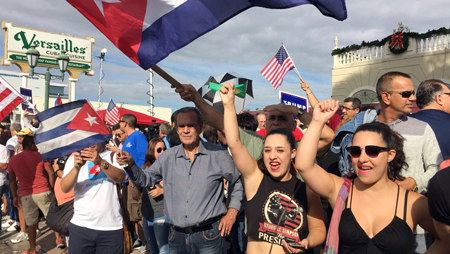

Forgetting Fidel
Se murió Fidel. Fidel is dead. No three words could have as much meaning for a Cuban American.
So many what-ifs, so many possibilities imagined over the years. Would he be overthrown, fall to an assassin’s bullet, or maybe light up one of those exploding cigars left over from the 60s? When it came, the end was quite banal. Out of the blue, a canned statement from his brother Raul, saying he had died at 10:29 PM.
I had just come back from dinner and my son, who is home from college, told me the news. At first I thought he was joking, until I turned on the television and saw the crowds gathering at the Versailles restaurant in Miami, banging on pots and pans, yelling “¡Viva Cuba!” I called my parents, who didn’t yet know, and heard the stunned disbelief in their voices. And then I told everyone I could, through e-mail and social media. It was like a secret that had to be told, even if it was no longer secret.
But why should the death of a frail, half-senile, 90-year-old man who wrote daffy editorials in Granma matter to us? It’s a Cuban thing.
Raul has been in charge since 2006. Tough, shrewd, and cynical, he controls all the levers of power, from the military to the tourist hotels, and nothing is likely to change in Cuba tomorrow, or anytime soon. In many ways, it would have been more earth-shaking if Raul had died, leaving no one in charge.
Yet Fidel was the Revolution. It was he who quoted Jose Marti as he marched down from the mountains to oust the despot Batista. It was he who spoke to adoring crowds lining the Malecón in Havana, promising to restore democracy. It was he who made my parents’ generation proud to be Cuban in the eyes of the world.
And it was Fidel who betrayed us, killing the bravest of our young men, imprisoning poets, artists, and all who spoke out against him, dividing countless families, turning brothers against each other, sending us into bitter exile, violating the very ideals of social justice he inspired, condemning the island to over half a century of soul-crushing tyranny which continues today, for the sole purpose of maintaining himself in power.
We’ll be hearing much about Fidel’s life in the coming days. American media’s infatuation with him began when Herbert Matthews trekked up the Sierra Maestre in 1957 to write a giddy profile in the New York Times, and continued with puff-piece interviews by Dan Rather and Barbara Walters, and the beaming biography of Tad Szulc. The last time Fidel came to New York, in 2000, he was fêted by Ted Turner. No doubt we’ll soon see him on the cover of Time.
In his own canned statement, Obama described Fidel as “singular,” an interesting choice of words, revealing himself as yet another fanboy (like the Pope, who asked Fidel for an autograph on his last visit to Havana.) Fidel certainly was singular, but so were many others throughout history who brought death and despair to the countries they purported to save.
In contrast, Trump called him a “brutal dictator.” Spot on, but it reeked of pandering to hardliners, no more sincere than Trump’s other positions. It was reported in Newsweek that he may have violated the embargo, though this mattered little to Florida voters. No doubt there will be a Trump hotel on the Malecón one day .
Our president and president-elect can fight it out between themselves. But there’s no need to rehash the late night arguments my friends and I had in college (Harvard Yard, circa 1978) of human rights vs. social justice, of education and health care vs. freedom of expression. And why demonize Fidel, when the facts speak for themselves? He began his career as revolutionary with a failed, suicidal attack on the Moncada Barracks in Santiago de Cuba in 1953. At his trial, he claimed “History will absolve me.” But the judgement of history will not rest upon those dormroom dichotomies but the state of Cuba today, after 50 years of Fidel. It’s a sad, dismal place (despite the journalistic clichés of happy-go-lucky natives driving vintage cars on cobblestoned streets) with little hope for prosperity other than increased tourism from the U.S., like in 1959. Forget about democracy, it’s all about dollars now. As revolutions often do, this one has come full circle.
Perhaps Fidel realized before he died that history would never absolve him, and simply pass him by. But we won’t forget Fidel, even if the rest of the world will, just like Batista and Machado before him. The image that will remain, indelibly burned into our imaginations, is not the bearded, victorious young revolutionary in battle fatigues, but the ailing old man, fear and confusion in his eyes, in that silly track suit.
Now that he’s gone, Fidel leaves a hole many of us filled with hate, with anger, with sadness, and an infinite longing for a country many of us never knew. How will we bridge this emptiness in our souls, this gap between what is and what could have been? Some of us will go to Cuba, whether for the first time like my son, or the first time in many years like my parents, and help rebuild that bereft, beautiful island. Some of us will continue our lives as before, having found closure.
But only we will remember him, we children of exile, those of us he kept from that island we still can’t forget. And that is the justice Fidel deserves, in this world if not the next.
Alfredo José Estrada is the editor of LATINO Magazine and the author of “Welcome to Havana, Señor Hemingway” and “Havana: Autobiography of a City.”